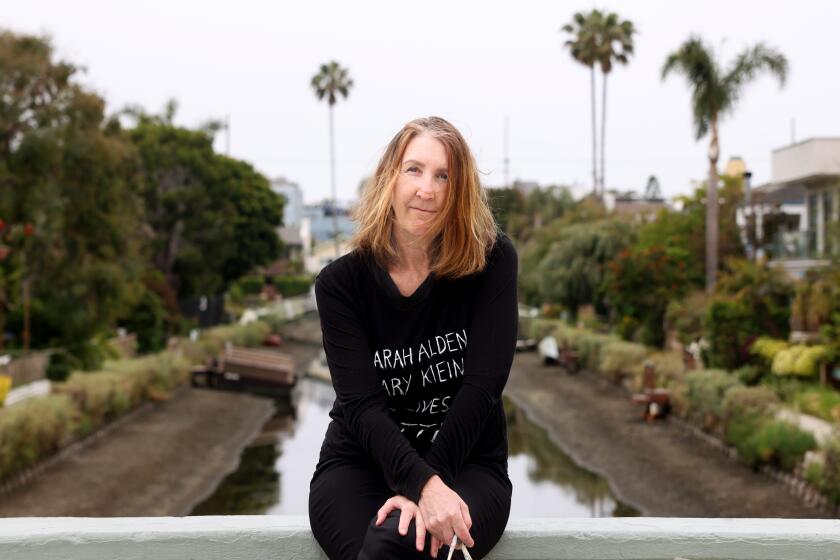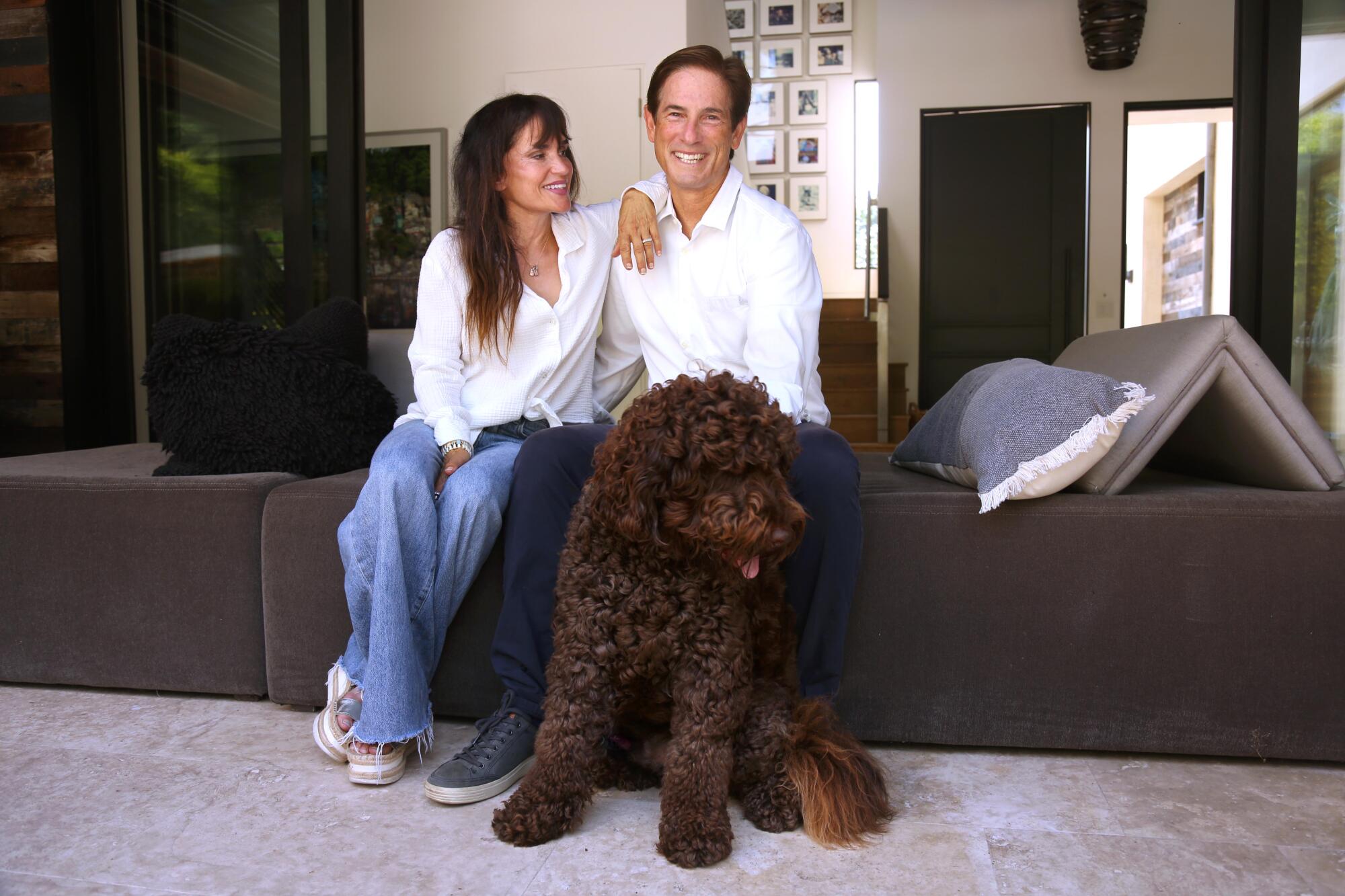
- Share via
While she waited for the man she hopes will defeat Los Angeles County Dist. Atty. George Gascón in November, Mary Klein slathered her face with a fresh coat of sunscreen. Klein — the survivor of a random attack along the Venice canals — sat with other crime victims, chasing slivers of shade in a muggy downtown L.A. courtyard, chatting about one of California’s most hotly contested races.
“People should vote to protect their family,” Klein said. “Safety is the preeminent issue for every single family and every single person — especially women and children. We’re intimidated on a daily basis.”
Klein’s April 9 assault was brutal — and in the case of a second victim, 53-year-old Sarah Alden, deadly. The story of two women being raped and bludgeoned by a vagrant in the beachside enclave seemed to confirm many residents’ worst fears about growing lawlessness.
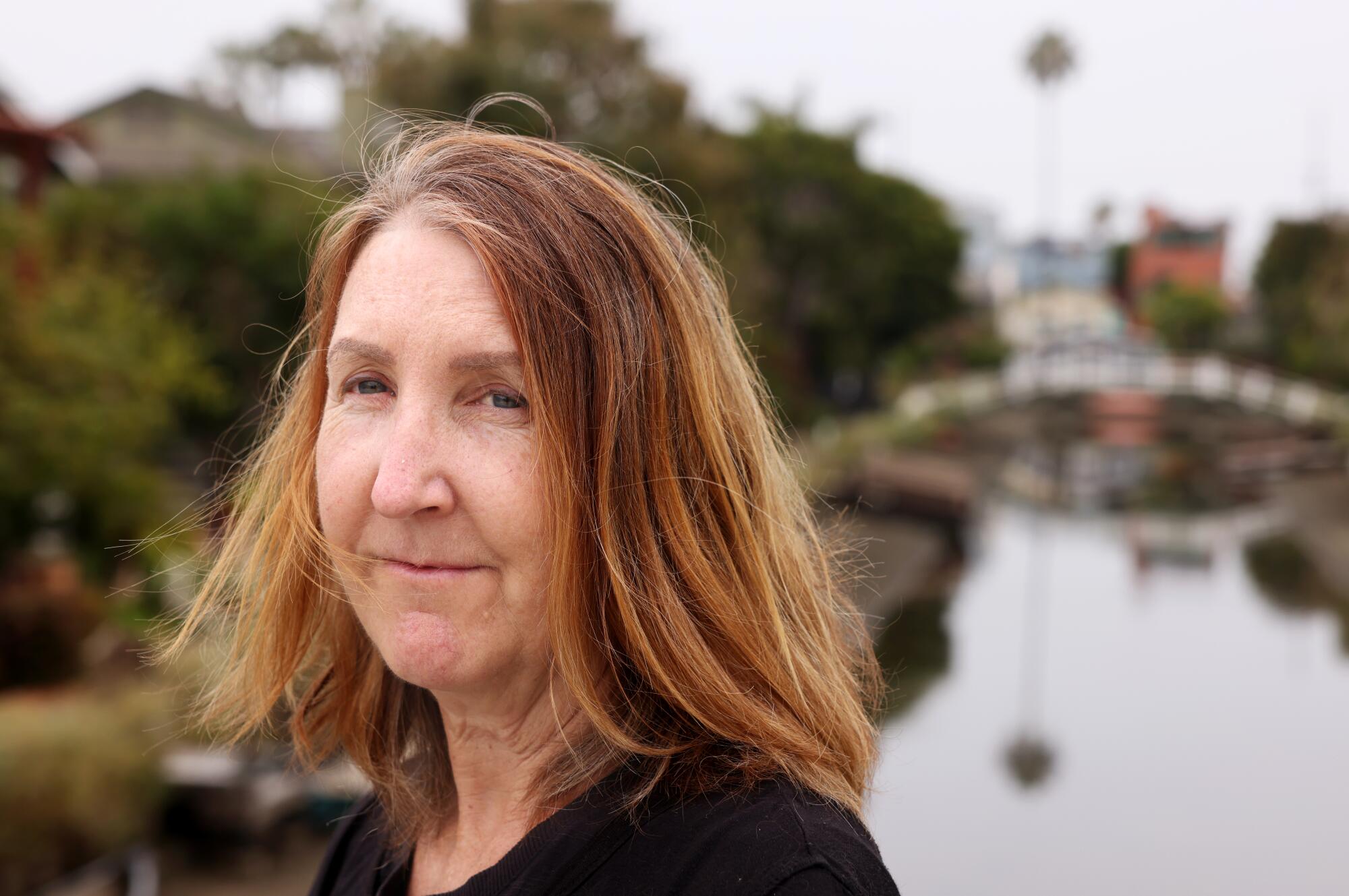
(The Times does not normally identify victims of sexual assault, but Klein, 55, has spoken out publicly about what happened.)
Gascón’s opponent, Nathan Hochman, is not a household name — something Klein and the others hoped to change when they agreed to parley with him in front of the TV cameras late last month. They were joined by a familiar face in local politics, billionaire mall magnate Rick Caruso, who had recently announced his endorsement of the defense attorney and former federal prosecutor.
To Klein — and a vocal subset of voters — almost anyone would be preferable to Gascón. The incumbent’s progressive policies are far less popular now than when he swept into office on a reformist wave in 2020, and for many, crime feels out of control, even if the statistics in some categories suggest otherwise.
Gascón won just 25% of the vote in the March primary — a weak showing for an incumbent — and a June poll by the firm Impact Research put his disapproval rating above 50% among likely voters.
After recall attempts, more than a dozen lawsuits from inside his office and a vote of no confidence from the county deputy district attorneys association, the so-called godfather of progressive prosecutors now faces a serious challenge in the general election.
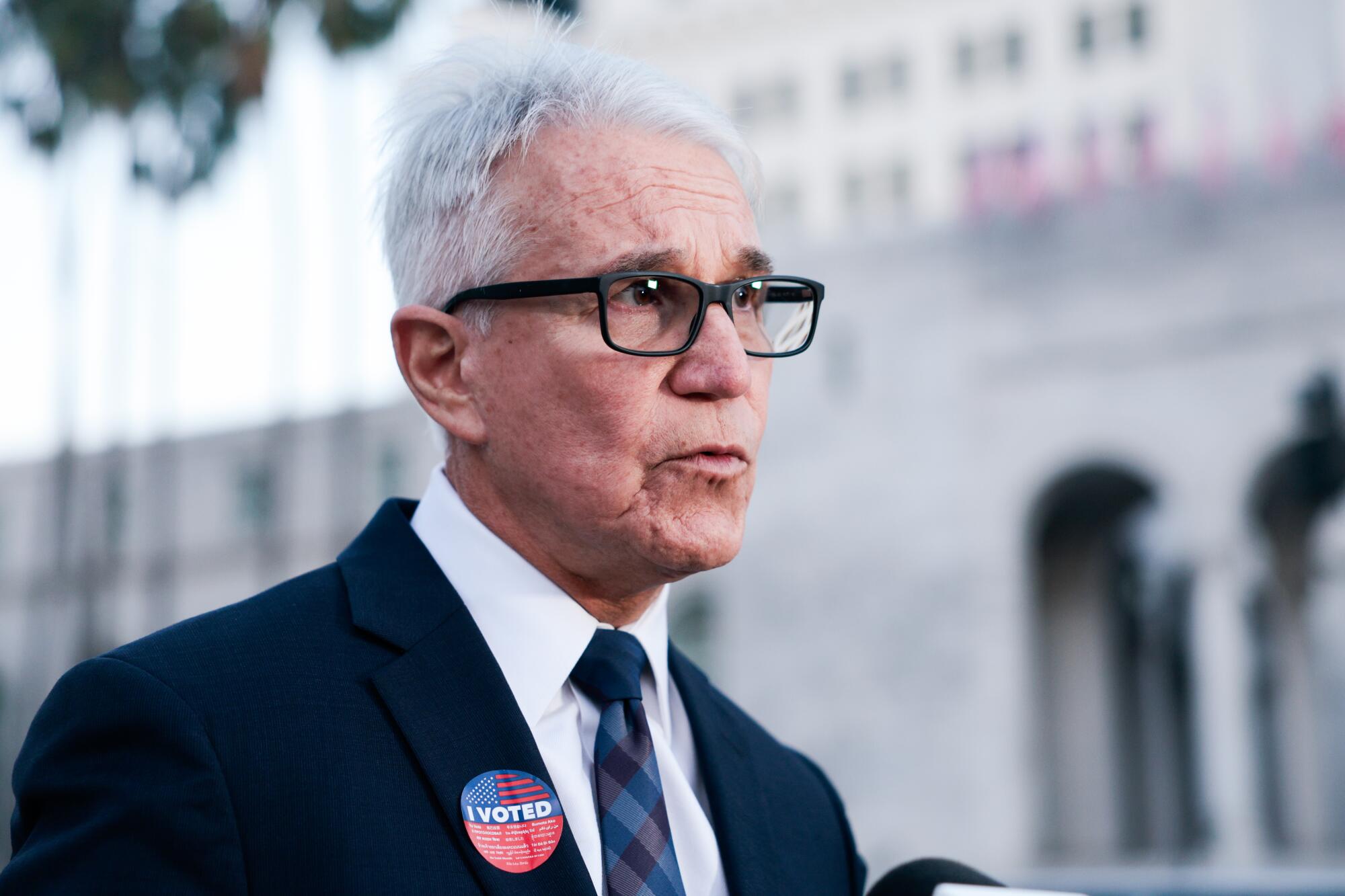
With a beaming, broken smile — her jaw now held together with screws and plates — Klein threw the moral weight of her suffering behind Hochman. She sought out the candidate, she said, believing him to be a sympathetic ear.
“I am supporting Nathan because I believe he’s much more aware of how crime is impacting regular people on a daily basis,” she said.
But who is Hochman, really? Is he cynically leveraging a conservative crime panic for his political gain, as opponents charge? Or does he have the experience, ground game and vision to beat one of America’s most-celebrated progressive prosecutors?
Hochman’s supporters and detractors alike say the attorney has just a few weeks left to transform himself from simply not-Gascón into something more specific.
“Summer’s the time that narratives get set,” said Gascón’s chief strategist Jamarah Hayner. “Post-Labor Day, it’s really a turnout game.”
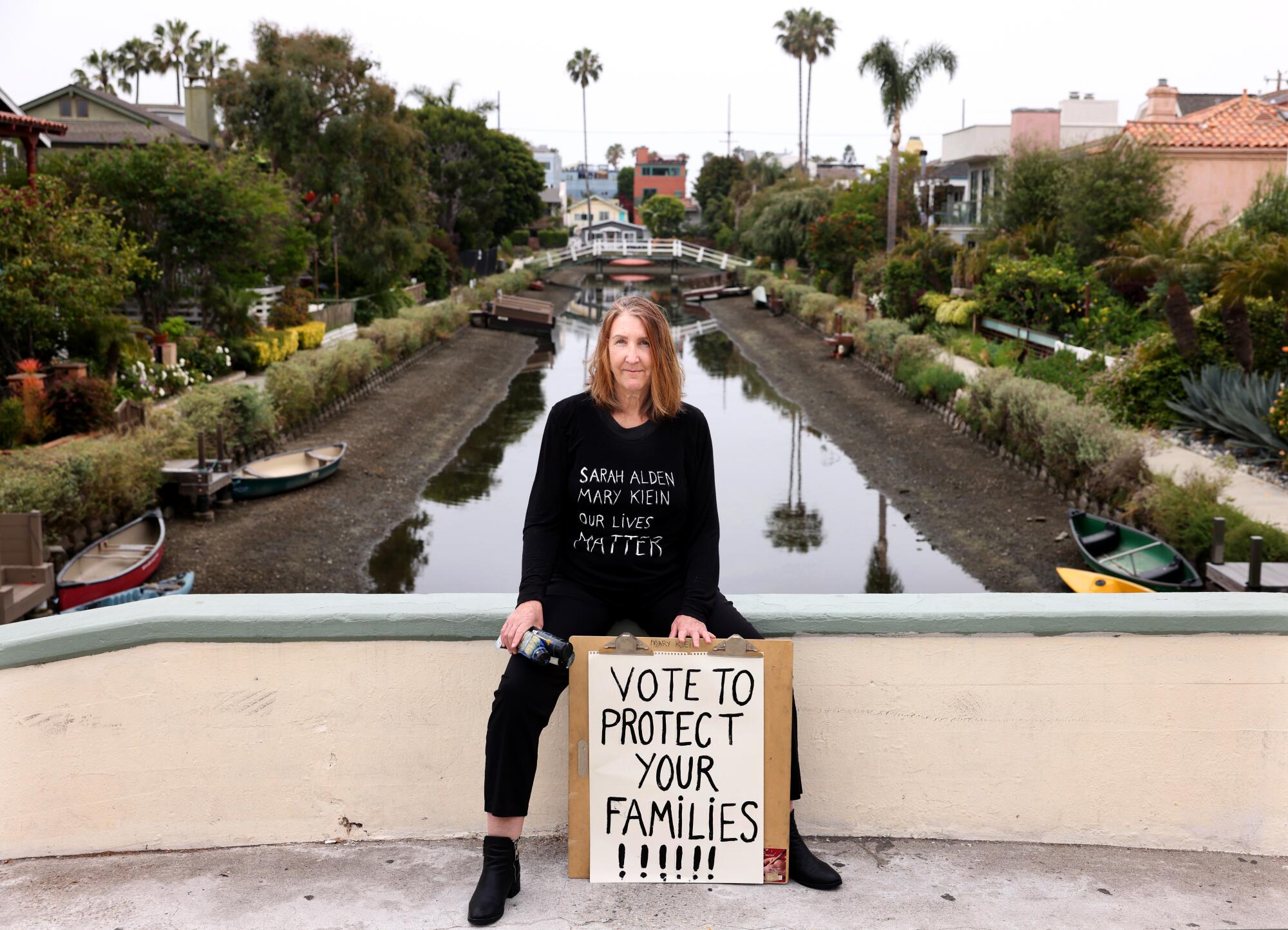
While violent crime is down in the city, according to the LAPD, the attacks — which prosecutors say were committed by a homeless man — have heightened years of debate about the area’s well-known homeless problems.
Hochman says his “hard middle” crime-fighting philosophy will win over the silent, centrist majority he believes is waiting to carry him to victory. Speaking to Klein and the other victims who had come to support him, Hochman declared that his foe had enacted “extreme pro-criminal, anti-victim policies on his first day in office.”
“The result is sadly an almost endless series of tragedies that we have experienced in this county over the last three and a half years,” he said.
While Hochman is running as an independent, he sought statewide office as a Republican two years ago and has worked with fundraisers who previously helped bankroll President Trump’s 2020 campaign.
Cristine Soto DeBerry of the Prosecutors Alliance of California, a progressive advocacy organization, said that Hochman “is the conservative choice, so the Republican money, the law enforcement money — those interests flocked to him.”
Turnout in November will almost certainly be higher — and meaningfully different — than it was in March. A July analysis of statewide voting patterns by the nonpartisan California Public Policy Institute showed older voters and Republicans were over-represented at the polls in the primary.
“As there’s more awareness of the crime that’s happening, I think people are going to come out and vote,” said Caruso — who chased a similar electorate with a similar narrative of a dystopian Gotham plagued by crime and mayhem, only to lose by nearly 10 points in the 2022 mayoral election.
“It’s not just ‘anyone but George’”
Hochman grew up in Beverly Hills, lives in Brentwood and — according to his wife, Vivienne Vella — sometimes “comes off as very formal. And a lot of times I’ll be like, ‘Get rid of the tie!’ ‘Take the jacket off!’ We were raised very differently.”
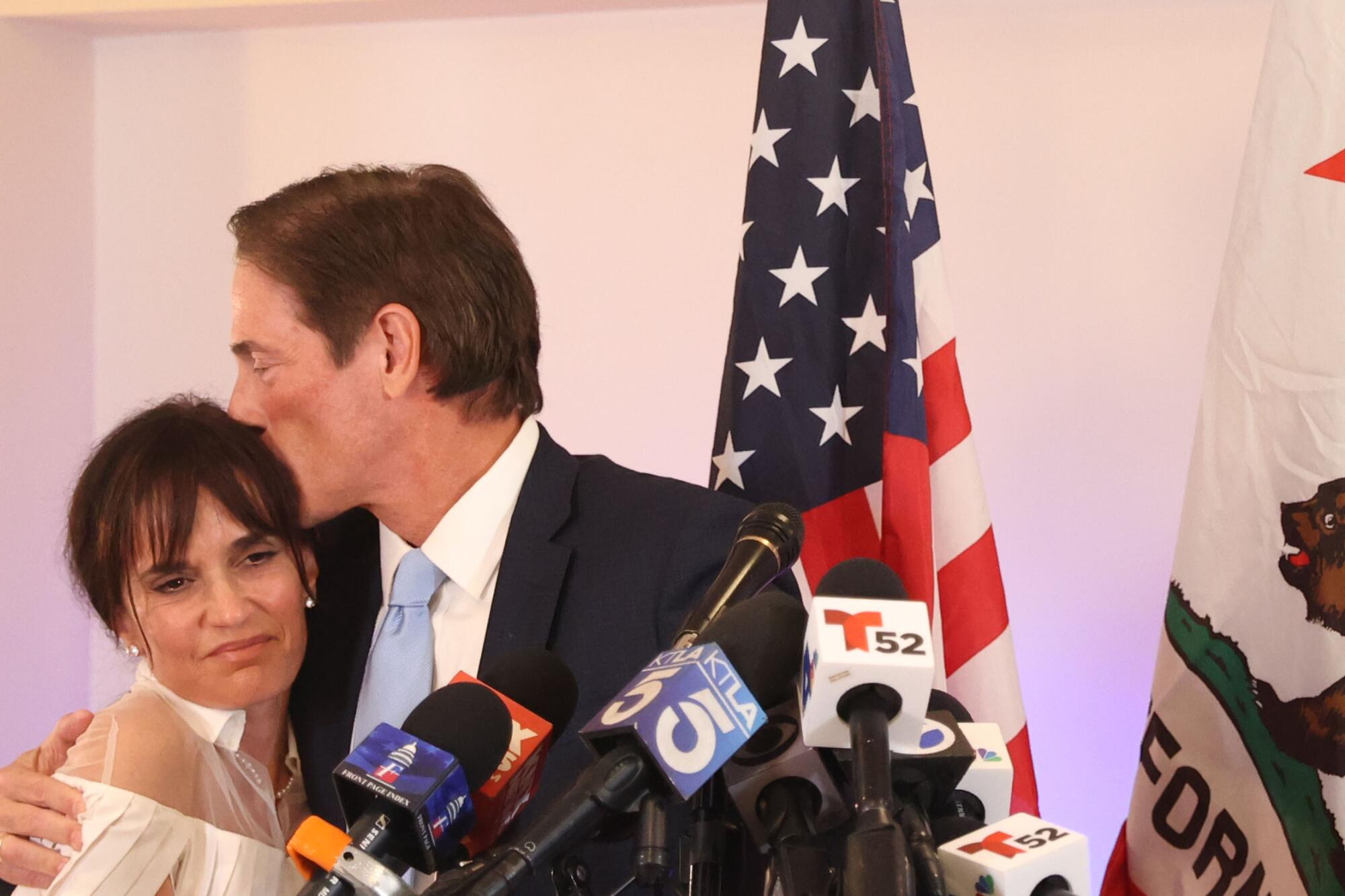
Hochman is the son of a defense attorney and a local philanthropist. He played varsity tennis and was president of his senior class at Beverly Hills High School, did his undergrad at Brown University and earned his law degree at Stanford.
“I really haven’t changed a lot,” the candidate said of his youth. “I was kind of like, a, you know...”
“Nerd?” Vella offered during a recent interview at a Starbucks near their home.
“Nerd, thank you,” Hochman replied.

Subscribers get exclusive access to this story
We’re offering L.A. Times subscribers special access to our best journalism. Thank you for your support.
Explore more Subscriber Exclusive content.
After law school, he clerked for a district judge before becoming an assistant U.S. attorney in California’s Central District, alongside future congressman and now-Senate hopeful Adam B. Schiff.
When Hochman’s three children were young, he ran the tax division of President George W. Bush’s Justice Department, then served on the Los Angeles Ethics Commission while pursuing private practice as a defense attorney.
“I think Nathan has the backbone,” said former L.A. City Atty. Carmen Trutanich. “You don’t need notoriety to be good. You need common sense, knowing right from wrong, and the strength to follow your beliefs.”
Vella was raised in Camarillo by a single father and has a decidedly more modest background than her husband — a fact that helped endear the couple to longtime Gascón antagonist Jonathan Hatami, who finished third in the historically crowded primary. Hatami, who has since endorsed Hochman, said he and his wife sat down with the candidate in Santa Clarita this spring.
“Some people are a little more guarded about themselves,” Hatami said. “That’s why I invited Nathan to my house — I needed to get to know him in a more personal way.”
As for voters, Hatami said, “maybe they need to meet him a few more times.”
In an effort to get voters past that polished exterior, Hochman has crisscrossed the county, meeting with residents, elected officials and dozens of deputy district attorneys.
“Everyone has their private and public faces,” said William W. Carter, a former federal prosecutor who worked with Hochman. “He’s a very funny, intelligent, charming person, but he’s very serious, especially when he’s focused on a particular case or an issue.”
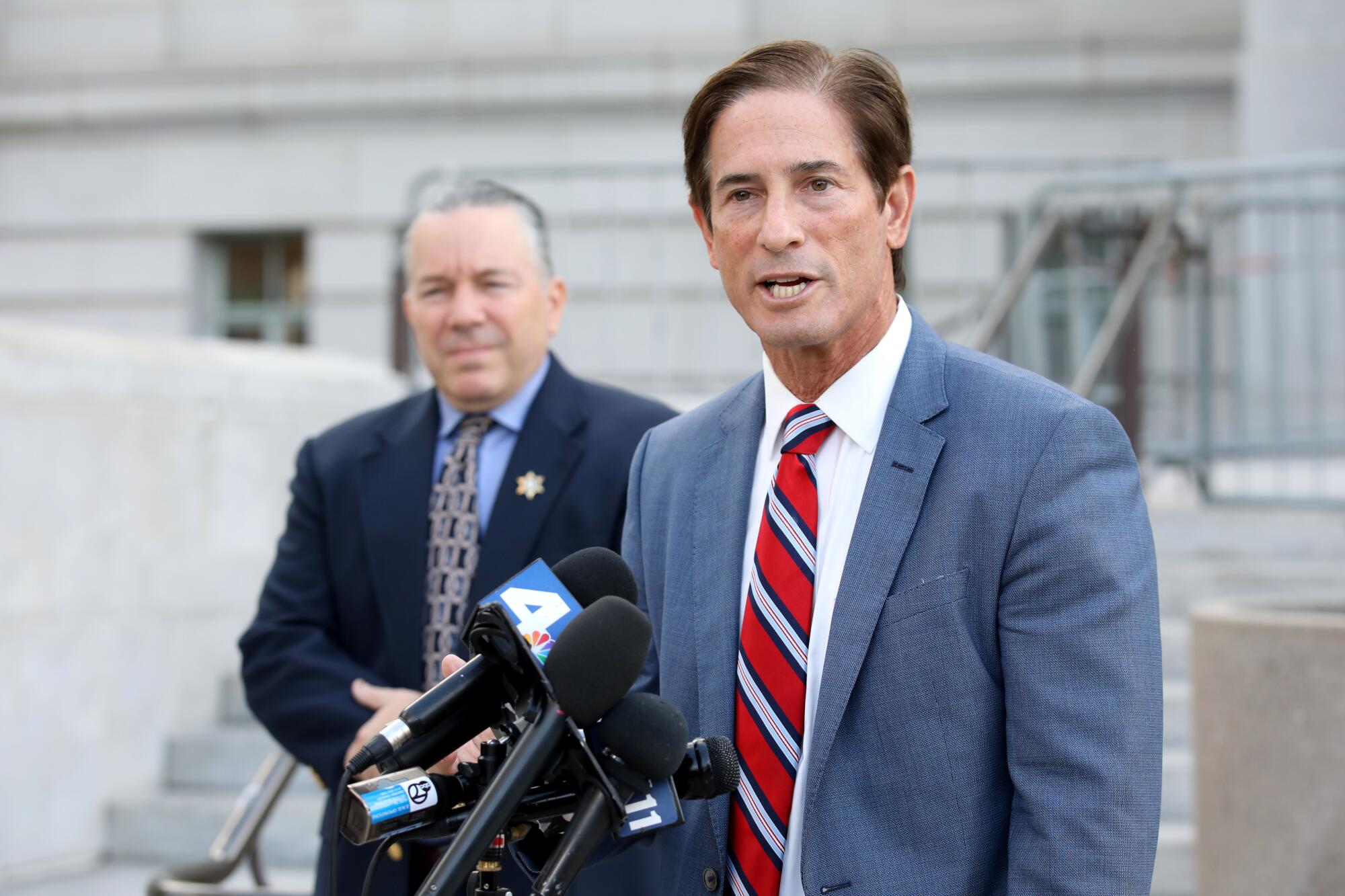
Hochman’s attention to the concerns of rank-and-file prosecutors helped earn him the support of former primary opponents beyond Hatami, including Deputy Dist. Atty. Maria Ramirez and Deputy Dist. Atty. John McKinney.
“It’s not just ‘anyone but George’ — I am on board with Hochman,” said Shareen Nizami, one of about three dozen deputy district attorneys who met with the candidate at a June event in North Hollywood. “It sounds like he has an actual plan that addresses victims, and is not just pushing an agenda.”
Hochman has seemed more ease among fellow prosecutors than at other campaign events, where he frequently hits the same talking points and laugh lines.
He’s vowed to roll back his opponent’s most controversial reforms — including special directives that are deeply unpopular among prosecutors. Among Gascón’s Day 1 initiatives were near-total bans on sentencing enhancements for gang affiliation or gun possession.
Hochman has promised to restore “qualified, experienced” insiders to positions of power within the sprawling office — the nation’s largest — recalling a cautionary lesson from his one-time client, the disgraced former L.A. County Sheriff Lee Baca, who was convicted of felony obstruction of justice and lying to the FBI in 2017.
“Lee Baca taught me that when a leader delegates to people underneath him, the leader finds the best people to delegate to, and then properly supervises them,” the attorney said. “Baca didn’t.”
Neither, in his view, does Gascón, whose top deputies have been dogged by scandal and charges of cronyism.
Still, Hochman’s buttoned-up mien can sometimes make it seem as though he has something to hide.
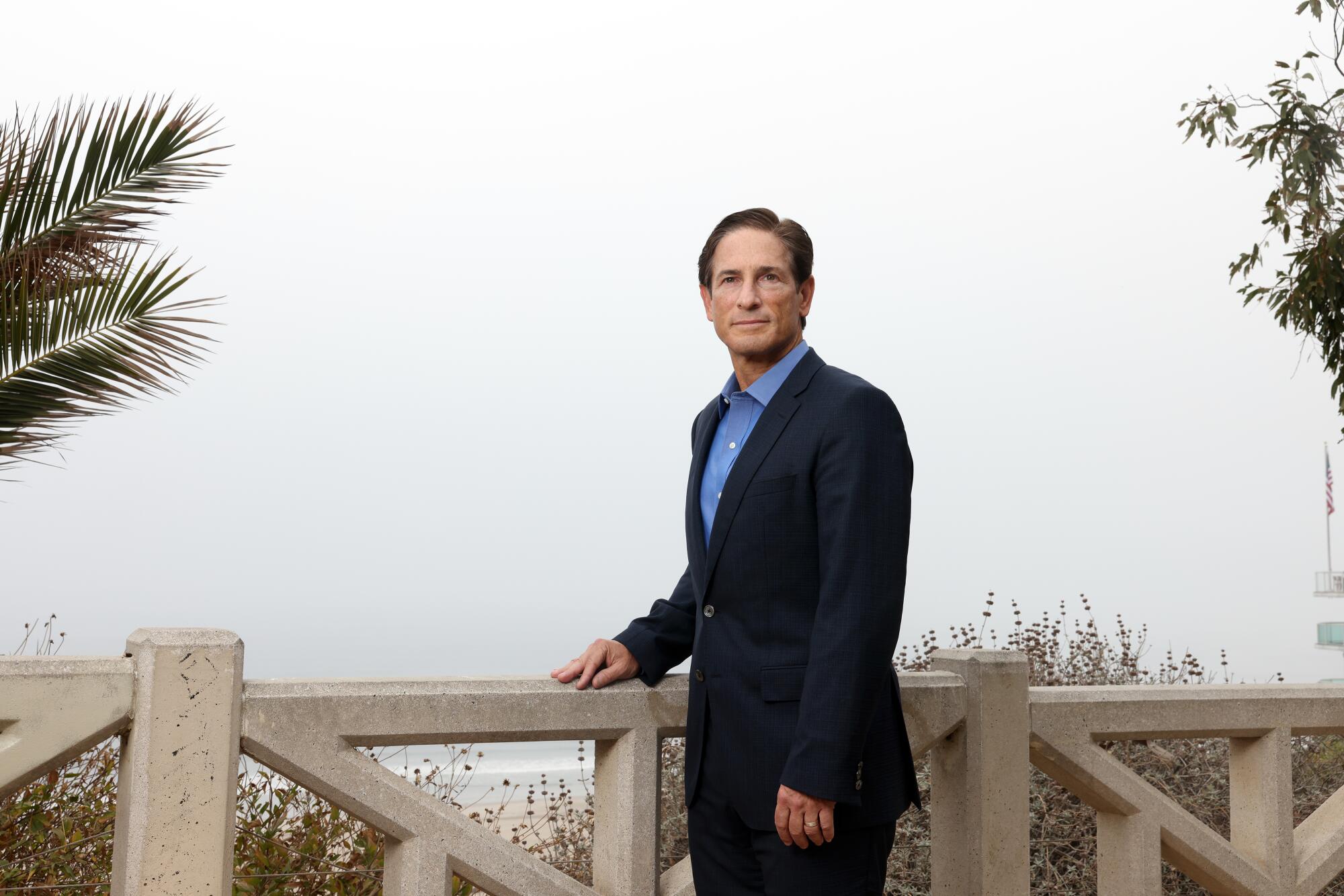
Since he began his run for D.A., he’s said little about his abortive run against Rob Bonta in the California attorney general’s race two years ago — an experience that is at once his greatest asset and his biggest political liability.
That contest catapulted Hochman into the D.A.’s race with a massive war chest and an unparalleled statewide donor base.
But it also left him with what some see as a scarlet letter in L.A. politics: He was registered as a Republican.
A Schwarzenegger Republican in the time of Trump
Since at least April of last year, Hochman has been running for a nonpartisan office as an independent. His donors and supporters span the political spectrum, but his past party affiliation could be a deal-breaker among one of the nation’s most liberal electorates.
That’s even more true this year, with Trump once again at the top of the Republican ticket.
Trump’s rhetoric is shaping the national conversation around crime, leading many to believe the country is becoming less safe when, in many places, data show the opposite.
“It’s a scary time to live in Los Angeles,” Gascón strategist Hayner acknowledged. “Whether it’s perception or reality, it’s reality when it happens to you, and your feelings about it are also reality.”
That’s left Hochman to define himself against Trump — a candidate he says he’s never voted for — and a party long remade in the former president’s hard-right populist image.
“In 2003 when Arnold Schwarzenegger became governor, I became what I call a centrist Republican, much in his mold,” Hochman said. “I thought, if that’s the direction of the California Republican Party, that’s the direction I want to go.”
But even the movie-star former governor — the last Republican elected to statewide office in California, back in 2011 — broke ranks with his party to denounce Trump.
The D.A. candidate and his allies have been quick to cry foul over claims he’s a closet conservative. After The Times published this story, a spokesman said Hochman “has taken numerous steps to publicly distance himself from the polarizing former president.”
Others have disputed that his rollbacks would constitute a return to the overpolicing and mass incarceration of the 1990s.
“People are fed up with the ideology,” said Caruso. “It’s about are you safe or are you not safe.”
Klein echoed his words.
“Our district attorney needs to take into account that their first job is to protect the public,” she said during the event with Hochman. “That’s why I’m here, because we’re not protecting our public.”
More to Read
Sign up for This Evening's Big Stories
Catch up on the day with the 7 biggest L.A. Times stories in your inbox every weekday evening.
You may occasionally receive promotional content from the Los Angeles Times.

